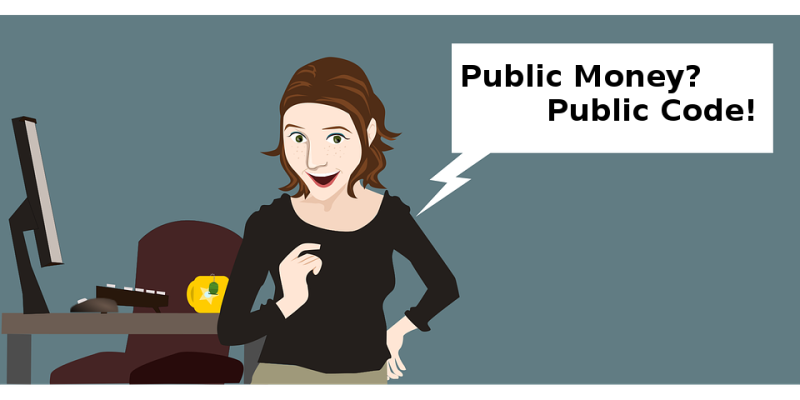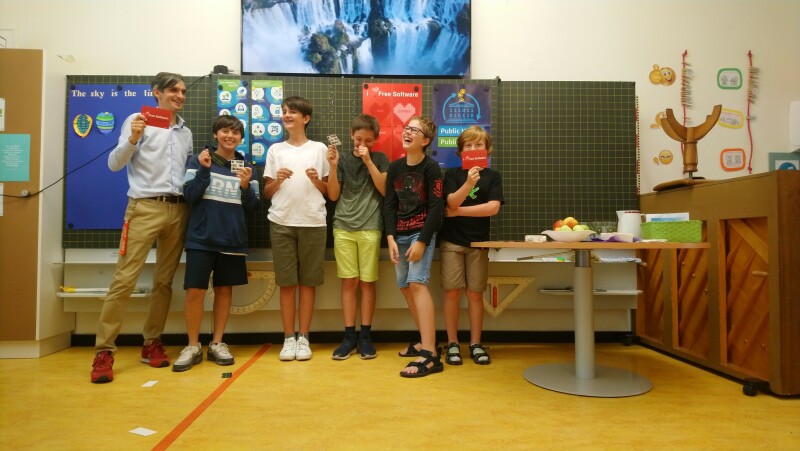FSFE: EU should reconsider the notion of "intellectual property"
In order to contribute to the European Commission public consultation regarding the update of the "Intellectual Property (IP)" regulatory system, the FSFE has published a first feedback. Based on its world-wide experience with Free Software, the FSFE calls for a more inclusive and decentralized regulatory system that allows sustainable knowledge sharing and intangible wealth.
The European Commission has launched an evaluation on the update of the European "intellectual property" regulatory system. In order to contribute to a fair and inclusive assessment, the FSFE took a stand against the expansion of copyrights, patents and trade secrets. We understand that expanding their scope of protection does not necessarily lead to innovation, competition and progress. Instead, increasing patentable or copyrightable matter could rather have the effect of stagnating sustainable innovation by limiting access and improvements to know-how, raising unfairness, and leading to stronger monopolies.
The FSFE urges the Commission to question the outdated notion that expanding monopolies over knowledge means more progress, consider whether EU companies will really benefit under these regulatory tools, and question the existing trend to expand state granted monopolies on software.
You can read our entire contribution below.

Sharing knowledge leads to progress
Input to the Roadmap on the European Commission "Intellectual Property Action Plan"
The Free Software Foundation Europe (FSFE) welcomes the European Commission's (Commission) initiative to upgrade the current "intellectual property (IP)" system. Nevertheless, we question the EC's strategy, which may lead to increased regulation on knowledge and intangible wealth. The FSFE understands that achieving a fairer and more sustainable environment for the digital economy is only possible by changing the existing paradigm that fortifying existing monopolies over knowledge and creating new barriers to knowledge sharing leads to progress. Based on our world-wide experience with Free Software (also known as Open Source), we advocate for a more inclusive and decentralized regulatory system that allows for the sustainable sharing of knowledge and intangible wealth.
"Intellectual Property" is a misleading term
Since 2001, the FSFE has been working as an independent non-profit organisation to protect and enhance the freedoms of technology users in Europe, fostering the dissemination of Free Software (also known as Open Source) principles and the adoption of technological solutions that promote innovation, competition and cooperation based on the rights of using, sharing, studying and improving software. The FSFE understands the term "intellectual property" to be ideologically charged and dangerously oblivious to the significant differences that exist between the many areas of law that it tries to subsume.
We therefore find the general premise of this public consultation to be problematic. The generalisation that strengthening "IP rights" must lead to better protection of creative works and a more resilient, greener, and more digital economy, does not fully take into account how copyright, patent law, trademark law, and trade secrets have diverse scopes of regulation, that can sometimes be at odds. There is no one unified set of law as “intellectual property”; these laws originated separately, evolved differently, cover different activities, have different rules, and raise different public policy issues.
Combining the term "rights" with "intellectual property" conveys the false idea that they are natural and intrinsic to our activity as human beings. This is however far from the truth. The effect of patent law, copyright and other related areas is to create temporary monopolies that exercise private power over other people. Monopolistic market actors can often benefit from such a structure, at the expense of healthy competition and other benefits for the commons. The FSFE therefore urges the Commission to use this opportunity to examine the effects that utilising the term "IP" and its current relevant definitions in EU policies, and the impact that this would have on the creation of a digital economy that can realistically achieve the goals the Commission has set in its initiative.
Fostering wealth not monopolies
The global issues raised by patents, copyrights, trademarks, or trade secrets show that it is too simplistic to say that each of these areas of law can jointly promote progress, fairness, innovation sustainably. The notion of "IP" management, protection and enforcement in Europe has been based on the school of thought that "more protection and expansion of "IP" rights must result in higher levels of innovation, development and competition". However, the Free Software regulatory and management models around the world have shown in the past 40 years that allowing the broadest amount of knowledge to be shared in society is a sustainable and more equitable regime to foster societal progress and wealth.
Free Software has revolutionised the way people interpret and work with copyright, showing that a balance between the protection and the sharing of knowledge can be achieved in a more equitable manner for people who depend on those rights to regulate their creations. Examples of that are the permissive and copyleft licensing regimes, which has enabled the utilisation, development, sharing and vendoring of software in models that respect the copyright owner’s private interests, as well as the collective interests of others to use, re-use, and further develop this software based on those rights.
Expanding the scope of protections around patents, copyrights, trademarks and trade secrets does not lead necessarily to innovation and competition, but to stronger monopolies. The FSFE urges the Commission to consider whether EU companies will really benefit under these regulatory tools, and how many would be pushed out of markets. Patent pools and restrictive copyright policies have become the privilege of larger multinational corporations, at the cost of smaller enterprise. In order for this initiative to be fully effective in forging a brighter digital future, the FSFE believes that an examination on how the existing copyright, trademark, and patent regimes have contributed to market consolidation and monopolies is also necessary, and whether introducing new laws to regulate large monopolies or oligopolies would help to achieve the goals the Commission has set in its initiative.
Finding better balance between copyright, patents and trade secrets
Just how fair, innovative, and sustainable the future European digital economy will be will depend on how patents, copyrights and trade secrets will be managed and enforced. The FSFE urges the Commission to investigate how the patents, copyrights and trade secrets intertwine to affect the future of the digital economy. It is impossible to explore the full capabilities of each system by promoting all of them at once. Software, an asset on which so many other areas of the human knowledge depends, is a work to which copyright, patents, and trade secrets can be applied at once. While generally either the concrete work (e.g. copyright in literature) is protected, it is possible to submit the underlying concept under patents in mechanical engineering. So with software it is clear that increasing the scope of patents can decrease the subject matter of copyright. Therefore, society's collective digital abilities cannot grow well, if large businesses can still restrict society with trade secrets, even -- or in the case of Free Software copyleft licenses especially -- if copyright rules are relativised.
The current regulatory systems for intangible works do not necessarily encourage innovation, but rather can have the effect of stagnating innovation by limiting access and improvements to know-how, specially for software. We therefore encourage the Commission to set up clear goals and strategies for patents, copyrights, trademarks and trade secrets, incorporating principles of human rights, social equity, and intellectual wealth. In practical terms, we believe that a digital economy requires a better and less restrictive approach to each one of these regulatory subsets in order to flourish. For software-related areas, we advocate in favor of a more collaborative patent regime, eliminating software patents, fairer copyright rules, a more equitable handling of trade secrets, as well as the enlargement of public domain.
Conclusion
Overall, the FSFE acknowledges the Commission's commitment to upgrade the existing regulatory system into a fairer environment for the digital economy. We recognise this as an opportunity to question the outdated notion that expanding monopolies over knowledge means more progress and question the existing trend to expand state granted monopolies on software. The Free Software regulatory and management model represents one of the best examples the Commission can take to deepen its understanding on how new models based on knowledge sharing are fundamental for a more innovative, fair, and socially just society.
You can find the submitted feedback here.
Support FSFE

 Les lois sur les brevets, les droits d'auteur et d'autres domaines apparentés restreignent l'accès à la connaissance et génèrent souvent des monopoles temporaires qui exercent leur pouvoir privé sur d'autres individus.
Les lois sur les brevets, les droits d'auteur et d'autres domaines apparentés restreignent l'accès à la connaissance et génèrent souvent des monopoles temporaires qui exercent leur pouvoir privé sur d'autres individus.
 Mairie de Munich.
Mairie de Munich.
 Sharing knowledge leads to progress
Sharing knowledge leads to progress
 Public Money? Public Code!
Public Money? Public Code!
 Participants at "Software development for girls and boys, with Free Software and Linux" in Kreuzlingen, Switzerland. (Peter Bittner, CC-BY-NC-ND 4.0)
Participants at "Software development for girls and boys, with Free Software and Linux" in Kreuzlingen, Switzerland. (Peter Bittner, CC-BY-NC-ND 4.0)
